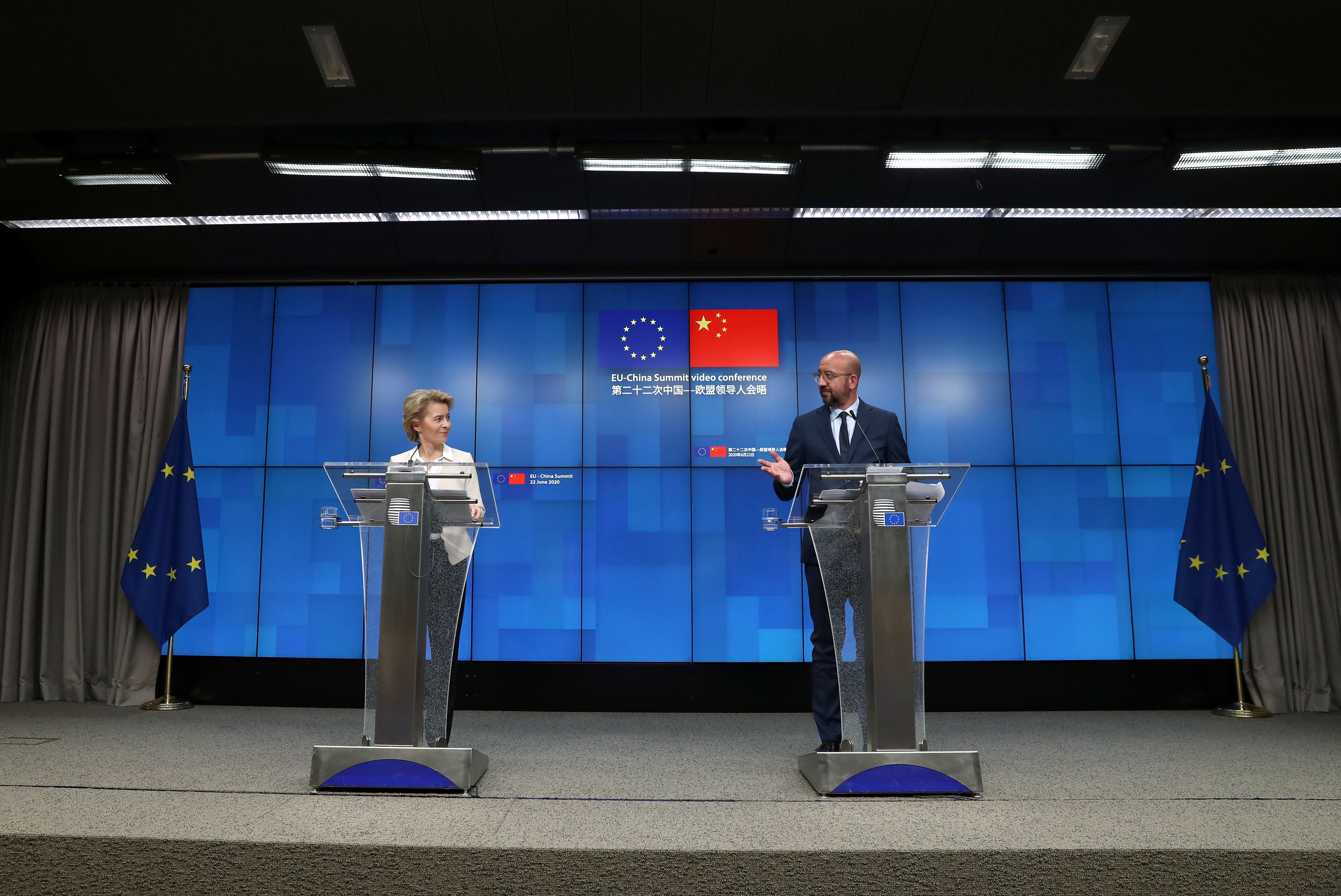Prospects for China-EU Relations in the Second Half of 2020

Plans for 2020 and Problems with Implementation
This year, China was hoping to persuade the new EU leadership not to pursue the sharper policy towards the PRC adopted by the previous European Commission, as stated in a document from March 2019. China wanted to take advantage of the de-escalation of the dispute with the U.S. after the January “phase one” trade agreement to exert pressure on the EU and, at the same time, maintain calm relations with the EU given the rivalry with the Americans. While the new EC planned to implement the policy from the previous year by introducing and proposing new protective instruments, it also intended to urge China towards reciprocity on economic issues (such as market access, regulation of state subsidies, abandon forced technology transfers, etc.) and cooperate on global problems, including climate change.
Three summits were planned for 2020—the EU-China Summit in March in Beijing, the China-Central Europe, “17+1”, meeting in April, also in Beijing, and, at Germany’s initiative, a summit of the 27 EU Member States and China in September in Leipzig during the German presidency of the Council of the EU. The pandemic has changed these plans. The EU-China summit was postponed to 22 June and took place in the form of a video conference. It concluded with deepened differences between the two sides. The “17+1” meeting also did not happen on time and a new date has not been designated yet. In June, Germany announced that the Leipzig meeting in September would not take place, and it is still unclear whether it has been postponed or cancelled.
China’s EU Approach
In December 2019, Chinese Foreign Minister Wang Yi signalled that in 2020 Chinese diplomacy will pay more attention to the EU. Wu Hongbo, a former ambassador to Germany was appointed a special envoy of the Chinese government to Europe.
After the outbreak of the coronavirus in China, the authorities asked the EU for help in supplying medical equipment and suggested not publicizing this information because of the difficult situation they were facing domestically. When the pandemic appeared in Europe, China began to pursue a policy towards the EU that made wider use of propaganda and disinformation. There were suggestions that the EU was not coping well with the health crisis or that the virus could have originated in Italy. China also heavily promoted its direct assistance to Member States in traditional and social media, bypassing the EU institutions.
China also has been pressing the EU to define its “system rival” term, which has been used since last year. The Union uses this expression, together with the terms “partner” and “competitor”, to describe China. At the same time, the latter has been effective in exerting pressure on the EU to limit claims of China as a source of the virus, its responsibility for the global spread of the virus and use cautious language in its publications, such as the May disinformation report or in a press release by 27 EU ambassadors in Beijing published in Chinese media. The PRC also has slowed the negotiations on the EU-China investment agreement and has not made progress in removing barriers to its market.
After the summit in June, the Chinese authorities argued that EU-China relations were going well. As evidence, they presented that the meeting actually took place (China pressed for it while the EU hesitated whether a video conversation should be treated as an official summit) and that negotiations on the investment agreement were continuing. The summit has been used for China’s domestic purposes to emphasize that the EU treats the PRC as a partner, important in the context of tightening U.S. policy towards China, global criticism of the PRC in connection with the COVID-19 pandemic, and suppression of Hong Kong’s autonomy. China also hopes that it will benefit from the differences between the U.S. and the EU, above all by not joining the Union to the Americans’ confrontational stance towards the PRC.
The EU’s China Approach
The new Commission continues the course of its predecessor, as evidenced by the decisions from the beginning of the year, including the adoption of the Guidelines for the security of 5G infrastructure and implementation of investment screening. The EC has also proposed new protection instruments, such as restrictions on market access for foreign state-owned companies and those receiving government subsidies for investments.
However, since the SARS-CoV-2 outbreak in the PRC, the EU has shown an incoherent approach towards China. EU assistance has temporarily improved bilateral relations but the Chinese propaganda after the pandemic appeared in Europe stiffened the Union’s position. In March, High Representative Josep Borrell emphasized that the EU should be ready for a “global battle of narratives” that China is pursuing . In May, that systemic rivalry with China intensified and the EU determined it needed an even more robust policy towards the PRC. At the same time, probably under the influence of growing tensions in transatlantic relations, Borrell began to signal a conciliatory approach to China. He claimed that it did not have military ambitions and did not threaten world peace, and that the EU and the PRC are not entering into a systemic rivalry.
The EU again tightened its China course just before the summit. This was expressed by a statement condemning disinformation in which China was explicitly mentioned or the White Paper constituting the basis for consultations with Member States on the introduction of restrictions on the activities of foreign state-owned companies and those supported by government subsidies. During the EU-China summit, the EU took a principled position on human rights issues, accused the PRC of disinformation and cyberattacks, expressed dissatisfaction because of the lack of progress on climate issues and lifting barriers to its market.
The EU’s inconsistent China policy in the first half of the year was the result of differences between the Commission and Parliament (in June, the latter adopted a resolution calling on Member States to sue China before the ICJ over limiting Hong Kong’s autonomy) and the head of the EEAS and the Member States. An example is Germany, which cooperates the most closely economically with China (15% of German exports outside the EU and, for example, about 40% of sales of cars by the Volkswagen group) and is not willing to tighten policy towards the PRC. The failure to hold the Leipzig summit in September is probably the result of, among others, the lack of clarity among countries about the purpose of the meeting, poor consultations with them on the topics of the summit, doubts in the EU institutions, as well as domestic pressure (e.g., by the Green Party or the FDP) on Chancellor Angela Merkel.
Prospects
This year, China will not improve its relations with the EU and will not stop it from implementing a sharper course. The EU, in turn, will be unable to persuade China to fulfil its commitments from last year. There is also little chance that the negotiations of an investment agreement will be completed.
Despite the differences, there has been growing convergence recently in the EU when it comes to a stronger approach to China. In June, Germany announced a sharper course on China during its EU presidency, although internal debate in that country still indicates a lack of consensus on the PRC. Central European Member States that are participants in the “17+1” format are also becoming more cautious about the PRC. After the experience with China this year—the disinformation, lack of progress on economic and global issues, limiting civil liberties and violations of international law, especially in Hong Kong—the EU is aware that it will be increasingly difficult to cooperate with the PRC. The European position will therefore become stiffer.
China will continue its attempts to avoid an EU consensus on tightening policy, especially in the face of the U.S. policy of confrontation. A conciliatory approach might be expected, such as a declaration recognising the EU principle of reciprocity but without specific concessions. The PRC will continue to treat the EU as a politically weak institution and wait for the results of the U.S. presidential election. It is still U.S. policy towards China that will largely define the latter’s approach to the EU.
In these circumstances, it is worth the EU focusing on introducing a wide catalogue of instruments to protect its own market. To strengthen its political position, the Union may consider hardening its stance not only on economic issues but also on human rights and global problems. The recent summit and the EU’s firm attitude towards these issues, as well as the ongoing work on a common approach to normative matters, such as the introduction of restrictions on the PRC at the EU and Member State levels (e.g., over China’s National Security Law on Hong Kong), are a good start.


